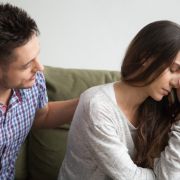Guilt (original) (raw)

Guilt is aversive and—like shame, embarrassment, or pride—has been described as a self-conscious emotion, involving reflection on oneself. People may feel guilt for a variety of reasons, including acts they have committed (or think that they committed), a failure to do something they should have done, or thoughts that they think are morally wrong.
Contents
What Is Guilt?

When one causes harm to another, guilt is a natural emotional response. Guilt is self-focused but also highly socially relevant: It’s thought to serve important interpersonal functions by, for example, encouraging the repair of valuable relationships and discouraging acts that could damage them. But in excess, guilt may needlessly burden those who experience it.
Does everyone feel guilt?
Not necessarily. The degree to which people feel guilt varies, and those with certain personalities may experience relatively little (if any) guilt. A lack of guilt and remorse is one characteristic that experts have used to diagnose psychopathy.
What is the difference between guilt and shame?
Shame and guilt are two closely related concepts. While each has been defined in different ways, guilt is typically linked to some specific harm, real or perceived, and shame involves negative feelings about one's self more generally.
Are some people prone to guilt and shame?
Excessive guilt can be a feature of certain forms of mental illness, including depression and post-traumatic stress disorder. The tendency to feel shame has also been associated with depression, anxiety, and other psychological symptoms. Factors such as social stigma related to one’s characteristics may also make shame more likely
When do children begin to feel guilt?
Children begin to feel guilt and may try to make up for guilt-inducing acts by their second year, research suggests, though the experience of guilt and associated behaviors appear to continue developing throughout childhood.
What is survivor’s guilt?
Survivor’s guilt (or survivor guilt) is an emotional experience that results from being relatively unharmed by a situation, compared to others. When one emerges from an accident or a conflict alive while others have died, for example, that person may experiencesurvivor’s guilt—despite not being responsible for the others’ deaths.
How to Cope With Guilt

Feeling guilt after a misdeed is normal and can often be remedied by apologizing and taking steps to make up for whatever pain or offense has been caused. But many feel guilt that is out of proportion to the harm they have caused, or even disconnected from any real harm. In such cases, it may be necessary to reflect on the reasons for one’s feelings of guilt—perhaps in conversation with a counselor or therapist, especially when an underlying mental health condition may be involved.
Why do I feel guilty about everything?
Though pervasive feelings of guilt are not necessarily a sign of an underlying mental health condition, they can be. Widely used criteria include regular feelings of “excessive or inappropriate guilt” among the symptoms of major depressive disorder and bipolar disorder, and guilt plays a role in other disorders as well. The guilt may be related to repeatedly thinking about minor failures or stem from things that are not actually within a person’s control.
Can you feel guilty for something that isn’t your fault?
What are some ways to feel less guilt?
When guilt stems from something you did to someone, apologizing and seeking to avoid repeating your behavior is one clear way to respond and could help you achieve self-forgiveness. But sometimes guilt is unrelated to actual misbehavior or becomes counterproductive. Remedies for unnecessary guilt may include reflecting on factors that were beyond your control, acknowledging what you know now that you didn’t in the past, and considering whether your standards for yourself are too unforgiving.
Yes. Given that guilt can be excessive or undeserved and that guilt can be an aspect of some mental health conditions, therapy can be helpful for addressing intense guilt. There are evidence-supported treatments for depression, for post-traumatic stress disorder, and for other conditions that involve pronounced feelings of guilt (though therapy may be helpful even in the absence of a diagnosed condition).
What are some ways to deal with a “guilt trip”?
When someone tries to instill guilt to get another to behave a certain way—an act often associated with mothers and their children—responding with empathy, while also setting limits when necessary, could help in getting out of the guilt trip. That may include acknowledging the importance of what the guilt-tripping person wants while also asking them to express their wants directly and to respect your decisions.
No is essential for your well-being, but shaking off guilt can feel impossible—unless you know how to shift your mindset and approach.
A Personal Perspective: Gratitude is good for us—but that doesn't always mean it's easy to practice.
Regardless of how warranted your self-righteous emotions may be, rationalizing why you took advantage of another, it still doesn’t help to hang onto feelings of guilt.
Embarrassment, shame, and guilt are all negative emotions you experience when you have done something wrong. Despite their similarities, they are distinct in important ways.
Regret is when you wish you had done something different, but you do not necessarily feel bad about yourself as a result.
Regret is when you wish you had done something different, but you do not necessarily feel bad about yourself as a result.
Shame has been branded as a toxic emotion while guilt has been widely perceived as preferable. Here's the problem: Avoiding shame means avoiding growth.
Shame has been branded as a toxic emotion while guilt has been widely perceived as preferable. Here's the problem: Avoiding shame means avoiding growth.
Discover the hidden power of guilt and shame: how they shape our behavior, foster connection, and, when unchecked, can lead to manipulation or deep emotional pain.
Discover the hidden power of guilt and shame: how they shape our behavior, foster connection, and, when unchecked, can lead to manipulation or deep emotional pain.
The worst forms of manipulation are those that unravel the sense of self.
The worst forms of manipulation are those that unravel the sense of self.
Physical absence may be the most reliable indicator.
Physical absence may be the most reliable indicator.
“Indecision may or may not be my problem.”- Jimmy Buffett
“Indecision may or may not be my problem.”- Jimmy Buffett
The reasons for remaining in a violent relationship are complex and can vary. One unifying theme is the belief that leaving is more dangerous than staying.
The reasons for remaining in a violent relationship are complex and can vary. One unifying theme is the belief that leaving is more dangerous than staying.
Breaking ties with a toxic family is tough. Cultural beliefs, guilt, and fear of loneliness create emotional barriers, making it hard to sever even the most painful relationships.
Breaking ties with a toxic family is tough. Cultural beliefs, guilt, and fear of loneliness create emotional barriers, making it hard to sever even the most painful relationships.
Setting boundaries can be tough. Discover 5 simple questions to help you protect your time and energy, say No with confidence, and prioritize what truly matters—without guilt.
Setting boundaries can be tough. Discover 5 simple questions to help you protect your time and energy, say No with confidence, and prioritize what truly matters—without guilt.
Learning how to offer forgiveness to ourselves and others can help alleviate feelings of guilt, remorse, and anger.
Learning how to offer forgiveness to ourselves and others can help alleviate feelings of guilt, remorse, and anger.













